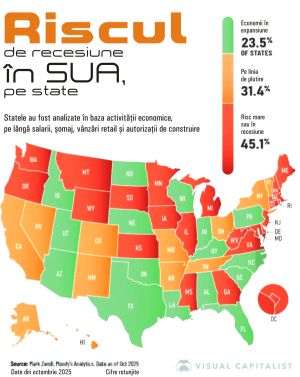Now that the end of the world through man-made global warming has been postponed, the administrative measures to counter the rising price of electricity have begun picking momentum on a European level.
Wall Street Journal recently wrote about the measures adopted by the German and Spanish authorities to significantly cap the subsidies and other support programs for renewable energy, as the price of electricity is increasing for individual consumers.
The electoral nature of the measures taken by Germany is quite obvious, because the limitations will expire at the end of 2014. The Spanish Parliament has adopted a similar measure, by reducing subsidies, and this will lead to a drop in the prices of electricity by 600 - 800 million Euros/year. The Association of the producers of renewable energy in Spain considers that the authorities want to crush the sector through legislative amendments.
What the Spanish makers of renewable energy are forgetting is that an extraordinary privilege was granted to them, by law as well, even though it was disconnected from any economic reality. The Czech Republic, however, stands out through the drastic measures it needs to stop the undermining of the economy by the renewable energy. "The current situation surrounding the photovoltaic power stations is not healthy and is threatening the economy of the Czech Republic," Prime Minister Petr Necas recently said on national television.
"The share of solar power in the Czech Republic's GDP is the highest in the EU and we are beginning to realize that something is wrong," the leader of the Government in Prague went on to say, who also reminded of the increasing aggressiveness of interest groups in the sector.
Between 2009 and 2011, solar energy saw a boom in the Czech Republic, due to the generous subsidy schemes, aligned, of course, to the European legislation.
According to the data from the ERÚ (the Bureau for the Regulation of Energy in the Czech Republic), the installed power of the solar plants was 2,085 GW at the end of 2012, greater than the biggest nuclear plant in the country. For the privilege of being the most developed country in Europe when it comes to solar energy, the share of the green energy in the price of one MWh increased by about 40% in 2013 compared to the previous year.
But where does the price of green energy in the Czech Republic come from and how was it set? The prices come from the ERÚ and were set in violation of the law. The roles of the regulatory institution include price control, the support of the use of renewable energy sources and... the protection of customers and of consumers' interests. Considering that these roles contradict each other, it's no wonder "confusions" occurred.
As unlikely as it would seem on first sight, the officials of the ERÚ have said that "some of the employees have broken the law when they set the price of solar energy between 2005 and 2011", according to news agency ÈTK. For now, the audit has only found that "the prices for the acquisition of solar energy were set in a non-transparent manner ". The final results will be published by the end of February 2013.
The additional costs for the taxpayers are of a magnitude of tens of billions of Euros for the subsidy period of approximately 20 years, according to the estimates presented by Tomas Chalupa, minister of the environment in the government of Prague.
Unfortunately, the result of the audit is predictable, as the minister of the environment said that "when support is promised, it can not be withdrawn, we can only stop it for the new solar energy sources".
In spite of the fact that the subsidies for the plants which are already operational were maintained, investors in the sector have filed lawsuits against the government. The club of international investors in photovoltaic installations (IPVIC), a group dominated by German companies, is looking to obtain "compensation for the considerable financial losses suffered as a result of the retroactive and discriminatory change of the legislation", according to the Czech press.
But who are the investors? The answer is a little harder to get, because five of the first twenty solar power plants in the Czech Republic have anonymous owners, according to the data of the ERÚ, published by news agency ÈTK.
What do they have to hide? I have to admit I am disappointed at this "shyness". I would have thought that any investor in renewable energy would be very proud of their contribution to the rescue of the planet.
As the Czech Republic is faced with the longest recession in its recent history, it is hard to believe that the authorities won't be increasingly pressured to stop the run-up in the price of electricity.
The central bank cut the policy rate to 0.05% in November 2012, after keeping it at 0.75% for two years, until May 2012. Quantitative easing didn't help, amid the drop in exports and the austerity measures. In Q4 2012, the GDP saw the biggest annual decrease in the last three years, of 1.7%. The deficit of the public pension fund increased in 2012 for the fourth year in a row and reached 2 billion Euros.
The last thing the Czech economy needs now is an increase in the price of electricity, especially since the official statistics show a significant difference between output and consumption.
At the end of 2011, the weight of electricity obtained from renewable sources in the total consumption was 10.3% and it is very unlikely that the Czech Republic will honor its European commitments, concerning the quotas of production and consumption of renewable energy, until 2020.
And the energy problems that the Czech Republic has aren't just domestic. ÈEZ, its state owned company with a significant presence in Central and Eastern Europe, is faced with the withdrawal of its licenses for operating in Bulgaria and Albania, amid the social protests generated by the hike of the price of electricity.
It would seem that our own survival takes precedence over the survival of the planet. After all, if the people don't survive, who will save the Earth anymore?
-----------
Note: This article represents the author's point of view, does not reflect or imply the opinions of the institution that employs him and does not represent an investment recommendation.
























































1. No catastrophe may be postponed
(message sent by T.M. on 02.03.2013, 09:06)
Mr. Rechea,your economic expertise could be used for a better cause.
In an irresponsible society,as that of today,no catastrophe may be posponed.
Do not take as valuable all that some officials are declaring,many 0of them do not understand the events.